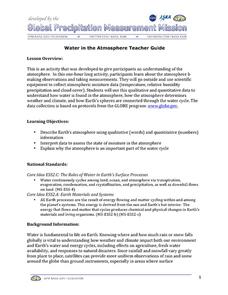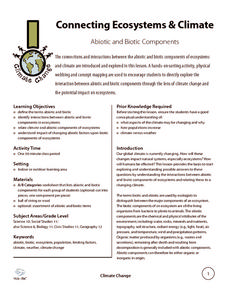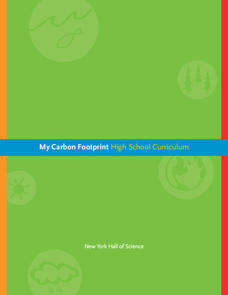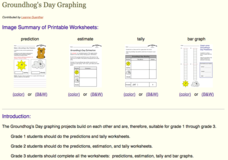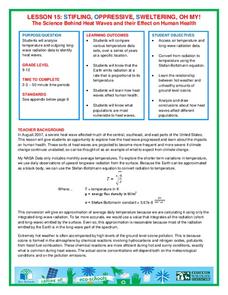Curated OER
Water in the Atmosphere
A slide show serves as the backdrop for a lesson on the moisture in Earth's atmosphere. Through it, mini meteorologists learn about the attributes of the atmosphere and actually use data-collecting weather tools to make observations and...
Pimsleur
The Weather
What's it like out today, and what do you plan to wear? These are the two main topics for this Italian lesson. By the end of the plan, pupils should have a grasp of basic weather and clothing terms as well as a general understanding of...
Curated OER
The Day After Tomorrow: How is the Density of Water Related to Climate Change and Global Warming?
Science learners simulate what happens when ice breaks up and floats on water and how increased pressure on ice causes it to melt faster. They view a clip from the movie, The Day After Tomorrow, and relate their lab activities to what...
National Wildlife Federation
The Tide is High, but I’m Holding On… Using ICESat Data to Investigate Sea Level Rise
Based on the rate of melting observed from 2003-2007 in Greenland, it would take less than 10 minutes to fill the Dallas Cowboys' Stadium. The 17th lesson in a series of 21 has scholars use the ICESat data to understand the ice mass...
PBS
Breaking it Down
After challenging themselves to correctly choose the form of erosion and length of time required for a given landform to develop, earth science class members model mechanical and chemical weathering with various lab demonstrations over...
National Wildlife Federation
Branching Out – Exploring Dendrochronology
Tree rings from North America give a continuous history of El Nino intensity over the last 1,100 years. Scholars learn how scientists use tree rings to create timelines demonstrating variations in weather patterns. The cumulative...
Center for Advanced Research on Language Acquisition (CARLA)
Bringing the Biodiversity of Ecuador to Spanish Immersion Classrooms
Designed for the Spanish Immersion classroom, scholars take a look at biodiversity and Ecuador; all the while, practicing their Spanish with a focus on verbs. In small groups, learners examine photographs of the different climate regions...
Wild BC
Connecting Ecosystems & Climate
Collaborators sort a set of cards into biotic and abiotic categories. Then, as a class, they discuss their work and relate each of the abiotic components to climate change. Finally, they form a web of components by connecting those that...
New York Hall of Science
My Carbon Footprint: High School Curriculum
The earth has a love-hate relationship with carbon. Learners complete a series of nine lessons that begin with an examination of the role of carbon in Earth's systems. They then relate changes in climate and weather to changes in the...
National Wildlife Federation
Get Your Techno On
Desert regions are hotter for multiple reasons; the lack of vegetation causes the sun's heat to go straight into the surface and the lack of moisture means none of the heat is being transferred into evaporation. This concept, and other...
Teach Engineering
Building a Barometer
Forget your local meteorologist — build your own barometer and keep track of the weather with an activity that provides directions to build a barometer out of a narrow necked bottle, a glass, and some water. Using their barometer, teams...
Colorado State University
Why Does the Wind Blow?
Without wind, the weather man wouldn't have much to talk about! Blow away your junior meteorologists with a creative demonstration of how wind works. The activity uses an empty soda bottle and compressible Styrofoam peanuts to illustrate...
Towson University
Looking Backwards, Looking Forward
How do scientists know what Earth's climate was like millions of years ago? Young environmental scholars discover how researchers used proxy data to determine the conditions present before written record. Grouped pupils gain experience...
National Wildlife Federation
Wherefore Art Thou, Albedo?
In the sixth lesson in a series of 21, scholars use NASA data to graph and interpret albedo seasonally and over the course of multiple years. This allows learners to compare albedo trends to changes in sea ice with connections to the...
American Chemical Society
From Gas to Liquid to Solid
From gas to liquid condensation to solid frost, water undergoes phase changes before young scholars' eyes! Using ice, salt, water, and a metal can, they set up an investigation that can be used in a physical science setting, or as part...
Core Knowledge Foundation
A Time for All Seasons - Spring
Celebrate the arrival of spring with this fun primary grade science unit. Engaging young scientists with a variety of hands-on activities and inquiry-based investigations, these lessons are a great way to teach children about seasonal...
Core Knowledge Foundation
A Time for All Seasons - Fall
The weather is cooling down and the leaves are starting to change color; fall is right around the corner. Celebrate this special time of year with this earth and life science lesson series that teaches children about the causes of...
Core Knowledge Foundation
A Time for All Seasons - Summer
The sun is shining and the birds are singing, what better time to teach young learners about the fun season of summer. In this week-long science series, children learn how the rotation and orbit of the earth influence the days and...
Kid Zone
Groundhog's Day Graphing
This Groundhog's Day, challenge scholars to predict, estimate, tally, and graph in a weather-themed lesson in which class members play the role of the groundhog to forecast the weather come February second.
Discovery Education
STEM Camp—Urban Infrastructure
Build a bridge to learning in a STEM-aligned unit about urban infrastructure. Young engineers explore the many aspects of civil planning and design in a five-day unit. Content includes the challenging aspects of balancing building with...
National Wildlife Federation
Stifling, Oppressive, Sweltering, Oh My!
Looking for a hot date? Pick any day in August, statistically the hottest month in the United States. The 15th lesson in the series of 21 instructs pupils to investigate the August 2007 heat wave through NASA data, daily temperature...
Science 4 Inquiry
An Investigative Look at Florida's Sinkholes
In May of 1981, the Winter Park Sinkhole in Florida first appeared and is now referred to as Lake Rose. Scholars learn about the causes of sinkholes through an inquiry project. Then, they analyze recent data and draw conclusions to...
PEGAMES.org
Duck Duels
If you're stuck inside on a rainy day for PE, or just want to give your class a body break, try out this fun game involving quick mental math and movement. Waddling around the classroom as ducks, learners compete in math duels, trying to...
It's About Time
Orbits and Effects
What does your world revolve around? Challenge the class as they learn about orbits and the effects of them on our modern world. Young astronomers begin by measuring ellipses and calculating the eccentricity of Earth's orbit. Then, they...


